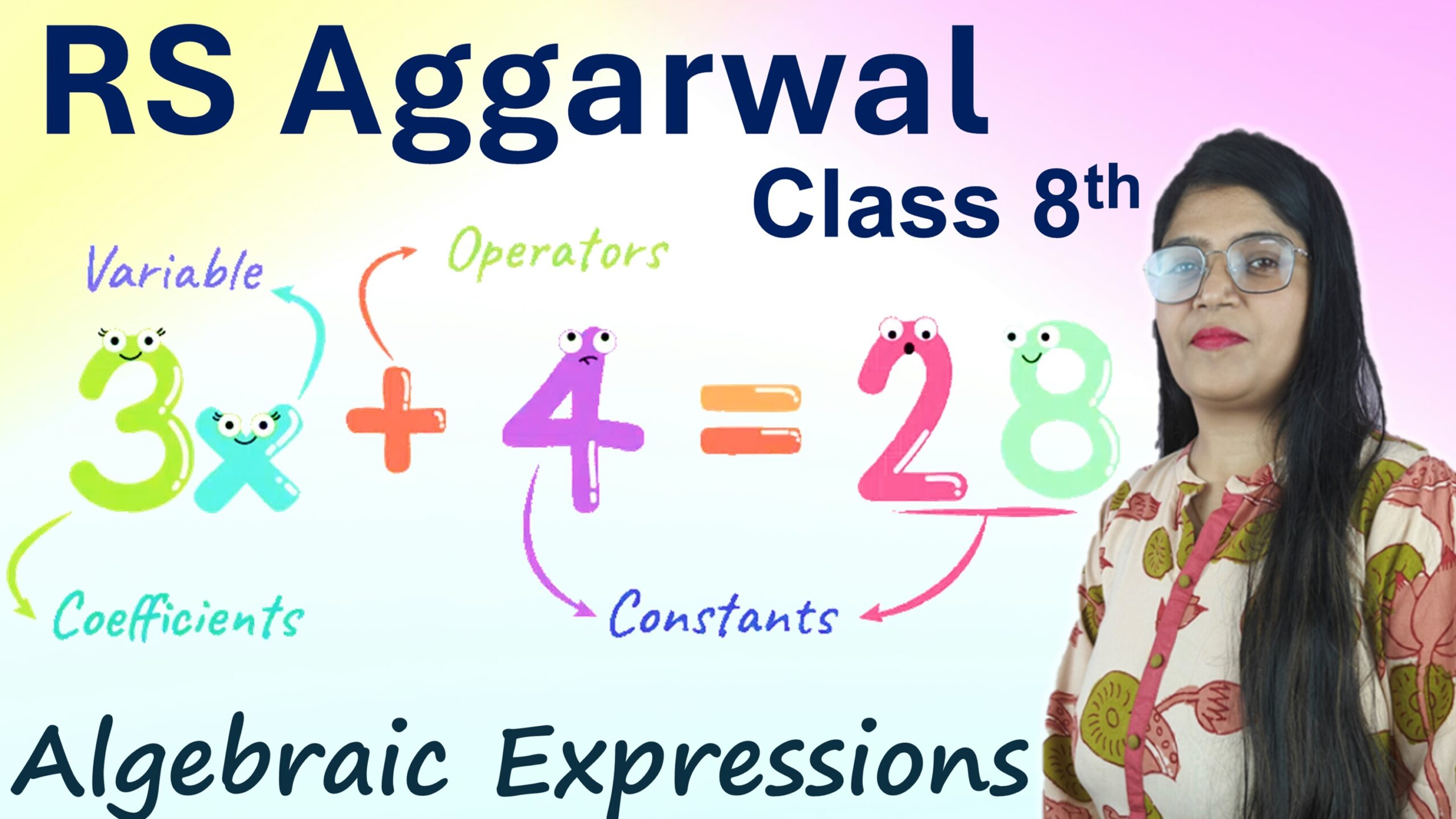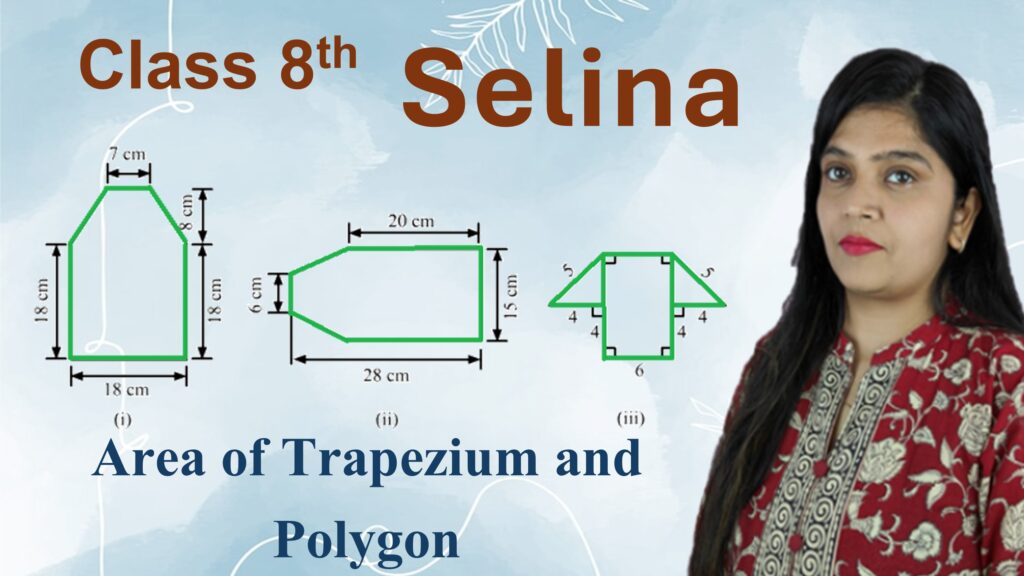Exercise: 12-C
Q1: Multiply:
i. \(8x^2\) by \(-5x\)
Step 1: Multiply the coefficients: \(8 \times (-5) = -40\)
Step 2: Multiply the variables: \(x^2 \times x = x^3\)
Answer: \(-40x^3\)
ii. \(\frac{2}{3}ab\) by \(-6a^2b\)
Step 1: Multiply the coefficients: \(\frac{2}{3} \times -6 = -4\)
Step 2: Multiply variables: \(ab \times a^2b = a^3b^2\)
Answer: \(-4a^3b^2\)
iii. \(7x^2y^3\) by \(-4x^3y\)
Step 1: Multiply coefficients: \(7 \times -4 = -28\)
Step 2: Multiply variables: \(x^2 \times x^3 = x^5\), \(y^3 \times y = y^4\)
Answer: \(-28x^5y^4\)
iv. \(\left(-\frac{5}{9}ax^2\right)\) by \(\left(-\frac{3}{5}bxa^2\right)\)
Step 1: Multiply coefficients: \(-\frac{5}{9} \times -\frac{3}{5} = \frac{15}{45} = \frac{1}{3}\)
Step 2: Multiply variables: \(a \times a^2 = a^3\), \(x^2 \times x = x^3\), include \(b\)
Answer: \(\frac{1}{3}a^3bx^3\)
v. \(\left(-\frac{2}{3}a^6b^5\right)\) by \(\left(-\frac{9}{4}a^2b^3\right)\)
Step 1: Multiply coefficients: \(-\frac{2}{3} \times -\frac{9}{4} = \frac{18}{12} = \frac{3}{2}\)
Step 2: Multiply variables: \(a^6 \times a^2 = a^8\), \(b^5 \times b^3 = b^8\)
Answer: \(\frac{3}{2}a^8b^8\)
vi. \(\left(-\frac{5}{8}p^2q\right)\) by \(\left(\frac{16}{25}pq^2\right)\)
Step 1: Multiply coefficients: \(-\frac{5}{8} \times \frac{16}{25} = -\frac{80}{200} = -\frac{2}{5}\)
Step 2: Multiply variables: \(p^2 \times p = p^3\), \(q \times q^2 = q^3\)
Answer: \(-\frac{2}{5}p^3q^3\)
Q2: Multiply:
i. \(\left(2x^2-5x+6\right)\) by \(-3x\)
Step 1: Multiply each term of the expression by \(-3x\):
\[
-3x \cdot 2x^2 = -6x^3,\quad -3x \cdot (-5x) = +15x^2,\quad -3x \cdot 6 = -18x
\]
Answer: \(-6x^3 + 15x^2 – 18x\)
ii. \(\left(3 – 2y – y^2\right)\) by \(-4xy\)
Step 1: Multiply each term by \(-4xy\):
\[
-4xy \cdot 3 = -12xy,\quad -4xy \cdot (-2y) = +8xy^2,\quad -4xy \cdot (-y^2) = +4xy^3
\]
Answer: \(-12xy + 8xy^2 + 4xy^3\)
iii. \(\left(3x^2y – 2xy^2 + 5xy – 6\right)\) by \(4xy\)
Step 1: Multiply each term by \(4xy\):
\[
4xy \cdot 3x^2y = 12x^3y^2,\quad 4xy \cdot (-2xy^2) = -8x^2y^3, \\
4xy \cdot 5xy = 20x^2y^2,\quad 4xy \cdot (-6) = -24xy
\]
Answer: \(12x^3y^2 – 8x^2y^3 + 20x^2y^2 – 24xy\)
iv. \(\left(7a^3 – 5ab^2 – 2b^3 + 3ab + 2a – 5\right)\) by \(-3ab^2\)
Step 1: Multiply each term by \(-3ab^2\):
\[
-3ab^2 \cdot 7a^3 = -21a^4b^2,\quad -3ab^2 \cdot (-5ab^2) = +15a^2b^4, \\
-3ab^2 \cdot (-2b^3) = +6ab^5,\quad -3ab^2 \cdot 3ab = -9a^2b^3, \\
-3ab^2 \cdot 2a = -6a^2b^2,\quad -3ab^2 \cdot (-5) = +15ab^2
\]
Answer: \(-21a^4b^2 + 15a^2b^4 + 6ab^5 – 9a^2b^3 – 6a^2b^2 + 15ab^2\)
Q3: Multiply:
i. \((a + 5)\) by \((a + 4)\)
Using identity: \((a + b)(a + c) = a^2 + (b + c)a + bc\)
\((a + 5)(a + 4) = a^2 + (5 + 4)a + 5 \cdot 4\)
= \(a^2 + 9a + 20\)
Answer: \(a^2 + 9a + 20\)
ii. \((x – 3) by (x + 8)\)
Use distributive law:
= \(x \cdot x + x \cdot 8 + (-3) \cdot x + (-3) \cdot 8\)
= \(x^2 + 8x – 3x – 24\)
= \(x^2 + 5x – 24\)
Answer: \(x^2 + 5x – 24\)
iii. \((y – 4)\) by \((y – 6)\)
Use identity: \((a – b)(a – c) = a^2 – (b + c)a + bc\)
= \(y^2 – (4 + 6)y + 4 \cdot 6\)
= \(y^2 – 10y + 24\)
Answer: \(y^2 – 10y + 24\)
iv. \((z + 1)\) by \((z – 7)\)
Use identity: \((a + b)(a – b) = a^2 – b^2\), but here b ≠ same
= \(z \cdot z + z \cdot (-7) + 1 \cdot z + 1 \cdot (-7)\)
= \(z^2 – 7z + z – 7\)
= \(z^2 – 6z – 7\)
Answer: \(z^2 – 6z – 7\)
v. \((3a – 2b)\) by \((2a + 3b)\)
Use distributive law:
= \(3a \cdot 2a + 3a \cdot 3b + (-2b) \cdot 2a + (-2b) \cdot 3b\)
= \(6a^2 + 9ab – 4ab – 6b^2\)
= \(6a^2 + 5ab – 6b^2\)
Answer: \(6a^2 + 5ab – 6b^2\)
vi. \((5x + 4y)\) by \((2x – 3y)\)
Use distributive law:
= \(5x \cdot 2x + 5x \cdot (-3y) + 4y \cdot 2x + 4y \cdot (-3y)\)
= \(10x^2 – 15xy + 8xy – 12y^2\)
= \(10x^2 – 7xy – 12y^2\)
Answer: \(10x^2 – 7xy – 12y^2\)
Q4: Multiply:
i. \(\left(4x^2+3x-5\right)\) by \(\left(2x+3\right)\)
Step 1: Use distributive property:
\[
(4x^2+3x-5)(2x+3) = 4x^2(2x+3) + 3x(2x+3) – 5(2x+3)
\]Step 2: Multiply each term:
\[
= (8x^3 + 12x^2) + (6x^2 + 9x) – (10x + 15)
\]Step 3: Combine like terms:
\[
= 8x^3 + 18x^2 – x – 15
\]Answer: \(8x^3 + 18x^2 – x – 15\)
ii. \(\left(3 – 2x + 5x^2\right)\) by \(\left(5x – 4\right)\)
Step 1: Reorder terms: \(5x^2 – 2x + 3\)
\[
= (5x^2 – 2x + 3)(5x – 4)
\]Step 2: Multiply each term:
\[
= 5x^2(5x – 4) – 2x(5x – 4) + 3(5x – 4) \\
= 25x^3 – 20x^2 – 10x^2 + 8x + 15x – 12
\]Step 3: Combine like terms:
\[
= 25x^3 – 30x^2 + 23x – 12
\]Answer: \(25x^3 – 30x^2 + 23x – 12\)
iii. \(\left(x^3 – 5x + 3\right)\) by \(\left(2x + 9\right)\)
Step 1: Multiply each term:
\[
= x^3(2x + 9) – 5x(2x + 9) + 3(2x + 9) \\
= 2x^4 + 9x^3 – 10x^2 – 45x + 6x + 27
\]Step 2: Combine like terms:
\[
= 2x^4 + 9x^3 – 10x^2 – 39x + 27
\]Answer: \(2x^4 + 9x^3 – 10x^2 – 39x + 27\)
iv. \(\left(4x^2 + xy + 9y^2\right)\) by \(\left(2x – 3y\right)\)
Step 1: Multiply each term:
\[
= 4x^2(2x – 3y) + xy(2x – 3y) + 9y^2(2x – 3y) \\
= 8x^3 – 12x^2y + 2x^2y – 3xy^2 + 18xy^2 – 27y^3
\]Step 2: Combine like terms:
\[
= 8x^3 – 10x^2y + 15xy^2 – 27y^3
\]Answer: \(8x^3 – 10x^2y + 15xy^2 – 27y^3\)
Q5: Multiply:
i. \((4x^2 – 4x + 1)\) by \((2x^2 + x – 2)\)
Using distributive property (each term in the first polynomial multiplied by each term in the second):\[
(4x^2)(2x^2 + x – 2) = 8x^4 + 4x^3 – 8x^2 \\
(-4x)(2x^2 + x – 2) = -8x^3 – 4x^2 + 8x \\
(1)(2x^2 + x – 2) = 2x^2 + x – 2
\]Now add like terms:\[
8x^4 + (4x^3 – 8x^3) + (-8x^2 – 4x^2 + 2x^2) + (8x + x) – 2 \\
= 8x^4 – 4x^3 – 10x^2 + 9x – 2
\]Answer: \(8x^4 – 4x^3 – 10x^2 + 9x – 2\)
ii. \((3x^2 + 4x – 5)\) by \((4x^2 – 7x + 2)\)
Multiply each term:\[
3x^2(4x^2 – 7x + 2) = 12x^4 – 21x^3 + 6x^2 \\
4x(4x^2 – 7x + 2) = 16x^3 – 28x^2 + 8x \\
(-5)(4x^2 – 7x + 2) = -20x^2 + 35x – 10
\]Now combine:\[
12x^4 + (-21x^3 + 16x^3) + (6x^2 – 28x^2 – 20x^2) + (8x + 35x) – 10 \\
= 12x^4 – 5x^3 – 42x^2 + 43x – 10
\]Answer: \(12x^4 – 5x^3 – 42x^2 + 43x – 10\)
iii. \((4x^2 + 24xy + 3y^2)\) by \((x^2 – xy + y^2)\)
Distribute each term:\[
4x^2(x^2 – xy + y^2) = 4x^4 – 4x^3y + 4x^2y^2 \\
24xy(x^2 – xy + y^2) = 24x^3y – 24x^2y^2 + 24xy^3 \\
3y^2(x^2 – xy + y^2) = 3x^2y^2 – 3xy^3 + 3y^4
\]Now combine:\[
4x^4 + ( -4x^3y + 24x^3y ) + (4x^2y^2 – 24x^2y^2 + 3x^2y^2) + (24xy^3 – 3xy^3) + 3y^4 \\
= 4x^4 + 20x^3y – 17x^2y^2 + 21xy^3 + 3y^4
\]Answer: \(4x^4 + 20x^3y – 17x^2y^2 + 21xy^3 + 3y^4\)
iv. \((6x^3 – 5x^2 + 4x + 1)\) by \((x^2 + 7x – 1)\)
Distribute each term:\[
6x^3(x^2 + 7x – 1) = 6x^5 + 42x^4 – 6x^3 \\
-5x^2(x^2 + 7x – 1) = -5x^4 – 35x^3 + 5x^2 \\
4x(x^2 + 7x – 1) = 4x^3 + 28x^2 – 4x \\
1(x^2 + 7x – 1) = x^2 + 7x – 1
\]Now add like terms:\[
6x^5 + (42x^4 – 5x^4) + (-6x^3 – 35x^3 + 4x^3) + (5x^2 + 28x^2 + x^2) + (-4x + 7x) – 1 \\
= 6x^5 + 37x^4 – 37x^3 + 34x^2 + 3x – 1
\]Answer: \(6x^5 + 37x^4 – 37x^3 + 34x^2 + 3x – 1\)
v. \((8x^4 – 3x^2 + 9x – 8)\) by \((2x^2 – 5x + 3)\)
Multiply each term:\[
8x^4(2x^2 – 5x + 3) = 16x^6 – 40x^5 + 24x^4 \\
-3x^2(2x^2 – 5x + 3) = -6x^4 + 15x^3 – 9x^2 \\
9x(2x^2 – 5x + 3) = 18x^3 – 45x^2 + 27x \\
-8(2x^2 – 5x + 3) = -16x^2 + 40x – 24
\]Now combine:\[
16x^6 – 40x^5 + (24x^4 – 6x^4) + (15x^3 + 18x^3) + (-9x^2 – 45x^2 – 16x^2) + (27x + 40x) – 24 \\
= 16x^6 – 40x^5 + 18x^4 + 33x^3 – 70x^2 + 67x – 24
\]Answer: \(16x^6 – 40x^5 + 18x^4 + 33x^3 – 70x^2 + 67x – 24\)
vi. \((3x^5 – 7x^3 + 2x^2 – x + 4)\) by \((x^3 – 2x^2 + 3x – 1)\)
We’ll distribute each term:
Step-by-step multiplication (key terms shown, grouped):
– \(3x^5 \cdot x^3 = 3x^8\)
– \(3x^5 \cdot -2x^2 = -6x^7\)
– \(3x^5 \cdot 3x = 9x^6\)
– \(3x^5 \cdot -1 = -3x^5\)
– \(-7x^3 \cdot x^3 = -7x^6\)
– \(-7x^3 \cdot -2x^2 = 14x^5\)
– \(-7x^3 \cdot 3x = -21x^4\)
– \(-7x^3 \cdot -1 = 7x^3\)
– \(2x^2 \cdot x^3 = 2x^5\)
– \(2x^2 \cdot -2x^2 = -4x^4\)
– \(2x^2 \cdot 3x = 6x^3\)
– \(2x^2 \cdot -1 = -2x^2\)
– \(-x \cdot x^3 = -x^4\)
– \(-x \cdot -2x^2 = 2x^3\)
– \(-x \cdot 3x = -3x^2\)
– \(-x \cdot -1 = x\)
– \(4 \cdot x^3 = 4x^3\)
– \(4 \cdot -2x^2 = -8x^2\)
– \(4 \cdot 3x = 12x\)
– \(4 \cdot -1 = -4\)
Now combine all terms:
\[
3x^8 – 6x^7 + (9x^6 – 7x^6) + (-3x^5 + 14x^5 + 2x^5) + (-21x^4 – 4x^4 – x^4) \\
+ (7x^3 + 6x^3 + 2x^3 + 4x^3) + (-2x^2 – 3x^2 – 8x^2) + (x + 12x) – 4
\]Final simplification:
\[
3x^8 – 6x^7 + 2x^6 + 13x^5 – 26x^4 + 19x^3 – 13x^2 + 13x – 4
\]Answer: \(3x^8 – 6x^7 + 2x^6 + 13x^5 – 26x^4 + 19x^3 – 13x^2 + 13x – 4\)
Q6: There are \(\left(3x+5y\right)\) shelves in a library and in each shelf there are \(\left(5x+3y\right)\) books. How many books are there in the library?
Step 1: We are given the number of shelves = \((3x + 5y)\)
Number of books on each shelf = \((5x + 3y)\)
Step 2: Total number of books = (Number of shelves) × (Books per shelf)
⇒ \((3x + 5y)(5x + 3y)\)
Step 3: Apply distributive property:
\[
(3x + 5y)(5x + 3y) = 3x(5x + 3y) + 5y(5x + 3y)
\]Step 4: Multiply each term:
\(= 3x \cdot 5x + 3x \cdot 3y + 5y \cdot 5x + 5y \cdot 3y\)
\(= 15x^2 + 9xy + 25xy + 15y^2\)
Step 5: Combine like terms:
\(= 15x^2 + (9xy + 25xy) + 15y^2\)
\(= 15x^2 + 34xy + 15y^2\)
Answer: The total number of books in the library is \(15x^2 + 34xy + 15y^2\).






Leave a Comment